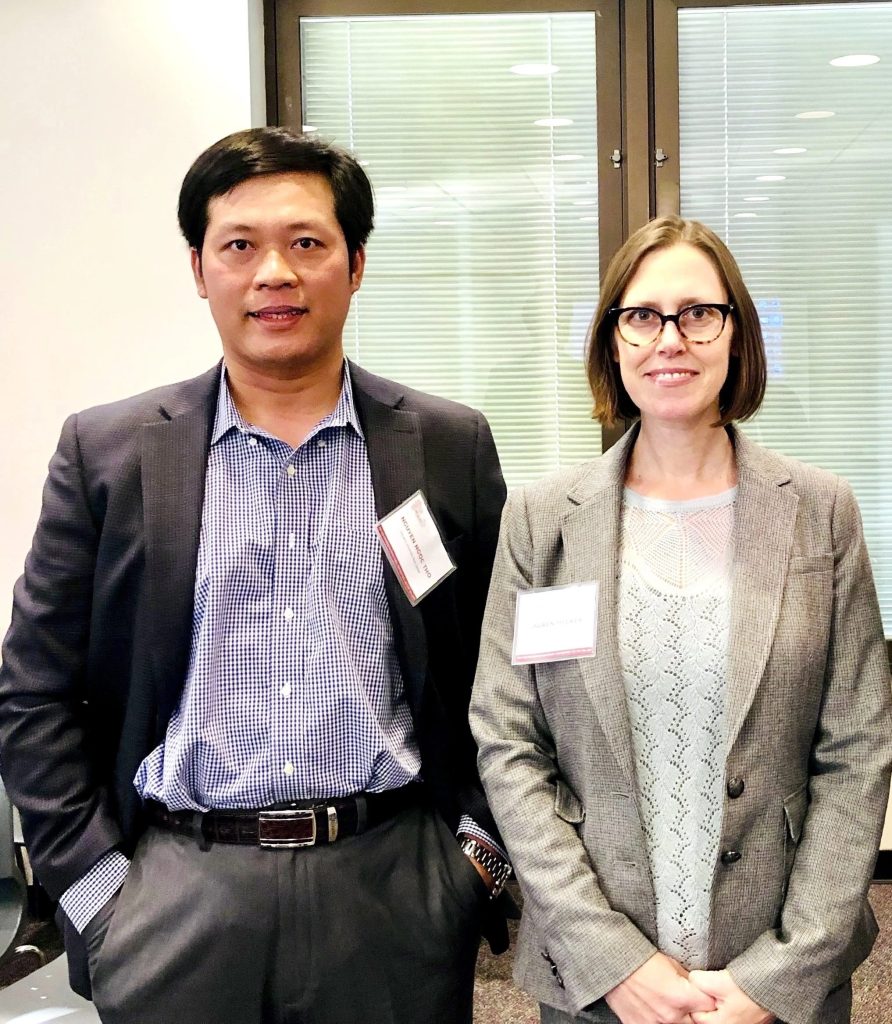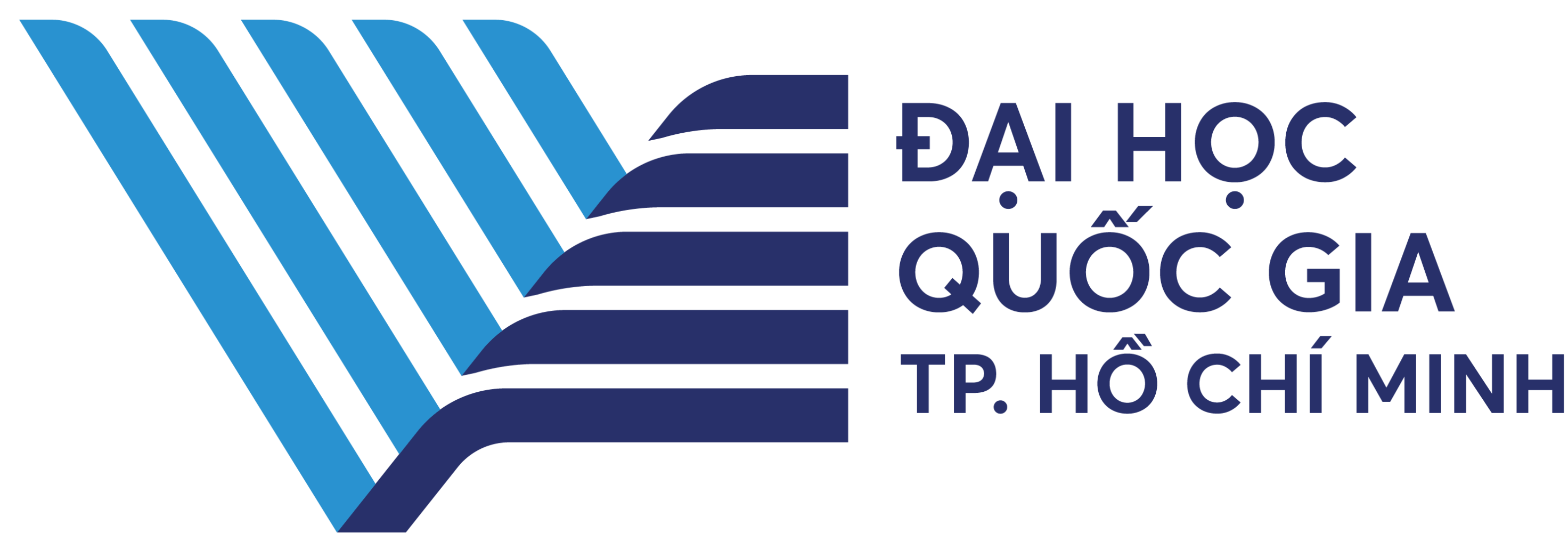Helping the World Understand Vietnamese Culture
After many years of being invited to research and teach language and Vietnamese culture abroad, Assoc. Prof. Dr. Nguyen Ngoc Tho has come to realize the importance of the Vietnamese culture's dimensions.
"The Vietnamese people have awakened,"
says Assoc. Prof. Dr. Nguyen Ngoc Tho (44 years old, Head of the Cultural Studies Department, VNUHCM-University of Social Sciences and Humanities. He began researching Vietnamese culture at a very young age and possessed enough qualifications to be invited by some foreign universities and institutes to research and teach.
Dr. Tho is proficient in two foreign languages, holds bachelor's degrees in Chinese studies and English linguistics, a doctorate in cultural studies, was awarded a scholarship for in-depth research by the Harvard-Yenching Institute, has numerous international publications, and achieved the title of associate professor at the age of 39.

Prof. Tho and Prof. Lauren Meeker, New York University at New Paltz
From 2017 to 2021, Assoc. Prof. Dr. Nguyen Ngoc Tho was continuously invited by three universities in the United States to conduct research and was arranged to present research results on Vietnamese culture in the context of East Asia and Southeast Asia at Harvard University, Boston University, and Brandeis University. During this time, he was also invited to present research projects at Cornell University and the University of California, Los Angeles. Before that, Dr. Tho was regularly invited by some universities and institutes in China, Thailand, and Taiwan to give lectures or teach about Vietnamese culture.
According to Assoc. Prof. Dr. Tho, in East Asia, Europe, and America, some departments and centers at universities offer Vietnamese language and Vietnamese culture courses, with prestigious Vietnamese studies journals. Currently, Vietnam is developing its economy rapidly, integrating strongly after reforms, and its international position is growing. Many international scholars see Vietnam's development model as quite successful and want to research, analyze, and dissect the changes in the country and its people.
Assoc. Prof. Dr. Tho recounts a touching story: "Many years ago, I went to Bangkok and saw a large billboard in the city with Thai writing but featuring an image of a Vietnamese girl wearing an áo dài. Surprised, I asked my Thai colleague, who told me it was their reminder, roughly meaning: yesterday, the Vietnamese were asleep, today they have awakened and are preparing to accelerate. Thais must know how to do it!"
Discovering the Depth of Vietnamese Culture
While in the United States, Dr. Tho found many documents and books scarcely available in Vietnam that wrote about Vietnam during the integration period, opening up the depth of Vietnam's relations with the region and the world.
"Before going abroad to research or teach, I asked myself many questions about the essence, the soul of Vietnamese culture. What sets Vietnam apart from the region and the world? Cultural essence can be expressed in various aspects such as cuisine, clothing, rituals, religious practices, and communication culture..., but behind and above that, there must be depth of thought, intelligence. When stepping out into the world, I realized more clearly that we should not hastily conclude that the good and beautiful things manifested through these specific aspects are the essence," recalls Assoc. Prof. Dr. Tho.
After many years of research, Dr. Tho found the answer. He reflects, "The good and beautiful aspects of Vietnamese culture lie in the depth of community cultural consciousness associated with the traditional agricultural village environment of the Vietnamese people, whether in the North, South, or anywhere else. A Vietnamese person, before becoming an adult or assuming a social position anywhere, first perceives the cultural traditions of the family, village, or neighborhood where they live. There are very close, vivid human relationships, and it is where the cultural foundation of their character is forged."
In addition, for generations, the Vietnamese have known how to compromise within the community, bridge differences, and build customs and agreements accepted by the entire community. The depth of thought, intelligence, and cultural essence of Vietnam partly lies in this aspect, in the "citadel" that helps our nation stand firm after thousands of years of domination, after numerous patriotic wars throughout history.
The questions about Vietnamese culture and the perspectives of Americans, Europeans, and East Asians during the process of research and teaching abroad have led Dr. Tho to have a more dialectical perspective, more openness, and to recognize the strengths and depth of Vietnamese culture in the overall picture, instead of struggling to find subjective answers from those within.
"Many things we have, the region and the world also have, such as patriotism, respect for teachers, the spirit of mutual help, and peace-loving spirit... Not to mention the process of cultural exchange and integration in history is extremely common. But the world still highly praises the intelligence and talent of Vietnam shown through the process of absorbing cultural quintessence from outside and adapting it to the national worldview. That is the real strength as we integrate with the world," shares Assoc. Prof. Dr. Nguyen Ngoc Tho.
Source: Thanh Nien Newspaper
Original article: https://thanhnien.vn/nguoi-giup-the-gioi-hieu-ve-van-hoa-viet-1851543803.htm

